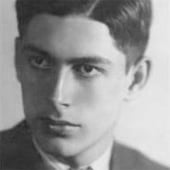
Gideon Klein
Multi-talented Moravian composer and pianist, Gideon Klein interned at Terezín concentraton camp * From age of 11 studied in Prague, attending Conservatory and graduating as its star piano student in 1939 * National Socialist Proctectorate barred him from accepting place at Royal Academy of Music in London * Largely self-taught as a composer, his studies with microtonalist Alois Hába ended when the Charles University was closed * Two decades younger than Krása and Haas, his music is more modernist in outlook * Strongest influences are those of Janácek, Schoenberg and Berg * Works from the late 1930s include a String Quartet and a quartertone Duo for violin and viola * Following deportation in 1941 to Terezín, he became a leading musical figure at the camp, as pianist, composer and arranger * Chamber music culminated in Fantasy and Fugue for String Quartet and String Trio * Transferred to Auschwitz, then Fürstengrube concentration camp where he was killed a few weeks before its liberation, aged 25
Works by Gideon Klein include:
Four Movements for String Quartet (1938)
String Quartet (1939-40)
Three Songs and Wiegenlied (1940/1943) for high voice and piano
Partita for String Orchestra (arranged by Vojtèch Saudek after Klein’s String Trio, 1944/90)
"Klein's works are an example par excellence of artistic strength. He wrote because it was a vital necessity to him, his only means of living." — Vojtèch Saudek
